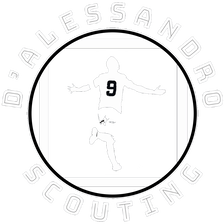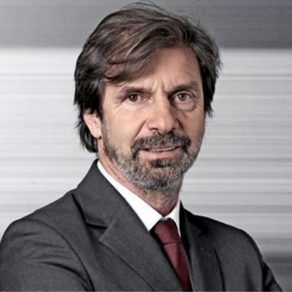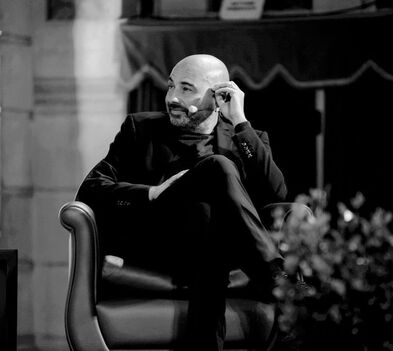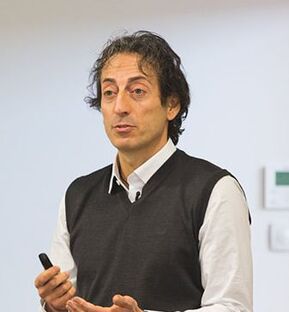The Latvian Project
Reading from the top to down below there are first of all the bio's of the three TOP professionals; nextly the general draft idea they have for the growth of Latvia's football movement. Its an idea that must be discussed and actualized with a deep and detailed picture of the present situation alongside the President of the Latvian Federation and his collaborators.
FILIPPO GALLI |
Filippo Galli is mostly remembered for his lengthy and successful career with A.C. Milan, where he played alongside Baresi, Maldini, Costacurta, and Tassotti, forming a strong defensive line-up under managers such as Arrigo Sacchi and Fabio Capello, in the teams which were respectively known as The Immortals and The Invincibles; during his 15 seasons with the club, he won five Serie A titles and three UEFA Champions League titles, among other trophies.
Following his retirement, Filippo began his coaching career. From 2004 to 2006 assistant manager of Primavera Milan, From 1 July 2006 to 30 June 2008 he trained the Primavera Milan team as head coach, previously by former teammate Franco Baresi. Since August 2008, he has joined Mauro Tassotti in the role of assistant coach of the first team, under Carlo Ancelotti. On 1 July 2009, he was entrusted with the role of Director of the Milan Youth Sector. On 30 June 2018 he leaves Milan; in nine years he has won an Italian Spring Cup (2010), an edition of the Viareggio Tournament (2014), a Championship with the Allievi (2010-2011), one with the Giovanissimi (2009-2010) and one with the Under 16 (2016-2017). The incredible work done as Milan youth director for 9 years (30 years of A.C. Milan totally), the modern working methods in the development of talent, the quantity and quality of players that became professionals, his organizational and managerial skills have earned him the opportunity to work at the FIGC for the development of youth football in Italy |
|
Edgardo Zanoli started his career in football world as a player on 1985 and concluded on 2002 after experiences from Eccellenza to Serie C. His managerial skills and professional mindset allowed him, after his retirement, to join U.S. Cremonese first as Talent Scout; therefore in just 4 years he made all the way up to General Director leading the team in Serie B in 2004/5.
After U.S. Cremonese and U.S.D. Caravaggese he finally joined A.C. Milan as Head of Milan Italy football schools and coordinator of basic activities supervising and coordinating Milan Football Schools (over 100, Italy and abroad) and Milan Junior Camps (Italy and abroad); he was also dedicated to the development of training contents for coaches and directors of Milan football schools. On 2015, he became also Responsible for Methodological Coordination of the Youth Sector A.C. Milan S.p.a. and Responsible of Milan Academy, working alongside Filippo Galli, until 2018. Edgardo is involved in several national and international projects for development of football; he is teacher and didactic coordinator of the Course for Heads of Youth Sectors in FIGC, lecturer in professional qualification courses for coaches at AIAC; he is also a lecturer at the Catholic University of Milan and at the Academy of Sport. Internationally, he carries out consultancy works for the development of academies (Russia) and consultancies for football Federations about development of the methodology (Israel). |
EDGARDO ZANOLI
| ||
DOMENICO GUALTIERI
|
Domenico Gualtieri is the Head of Academy Sport Science & Methodology at Parma Calcio 1913 from 2019 with a background as athletic trainer. The Bachelor Degree in Sport Science, the Bachelor Degree in Physical Education and the Professional Athletic Trainer degree for football UEFA A PRO Fitness Coach led him to start his career at F.I.G.C. Italian National Team as athletic trainer for Men Teams (U16-U17-U19) and Women Teams (U17-U19) & Second Team (U21) from 2001 to 2004 collecting 3 Participation Final Round European Championships with U19M & U19W.
Later in the same year, Domenico joined A.C. Milan as Head of Milan Lab Project Academy & Associate of MilanLab Project for the First Team. The great results and performances of the U17 and U18 winning respectively the leagues in 2006/7 and 2008/9 led him to become also the Head of Academy's Athletic Department in 2009, under the guidance of Filippo Galli, until 2018. Significant results have benn achieved in the competitions (5 wins in the U15-U17 championships in 10 years) and in the promotion of professional players to the first team (34 players in the first three Italian divisions). Domenico is very active also in teaching and research out of the football club environment; over 18 years as Teacher of Sport Science at the State University of Milano, 4 years as Teacher at Italian National Federation Technical Center, 27 scientific publications and 3 original books publications (one of which was awarded by CONI as the best sports publication in 2007). | ||
The idea of an integrated (or integral) method. It is a question of developing all the corporate areas in a participatory manner and with the common denominator of the game (not the game in general, but our way of understanding the game). Participatory training has as its goal the growth of human capital, the game (underlying the player's training) is the common goal that binds the group. To put this organizational method into practice, it is necessary to create work devices that allow it: training, video analysis, programming, staff meetings, observation tools, evaluation forms, individual interviews, etc. From the point of view of the game the choice (after an in-depth study on European football) is summarized on two macro constructs "the game on principles" and "the game of possession".
The primary objective is the development of the ability to choose. To develop the work in this direction, a huge amount of staff training has to be done.
We definitely believe in a football that leads to the development of proactive skills of the players and to a football oriented to the domination of the competitions. The player is a "unique" and therefore we can only train him fully, so the development areas are not divided but trained together (technical, tactical, emotional, athletic). We believe in confrontation, in the importance of sharing objectives and method.
Any project needs a period of study and observation. We would be presumptuous in saying today what can be done, we do not have enough elements. We certainly believe that it is essential to integrate into the local culture and respect it. We imagine people dedicated to work, accustomed to athletic football and linked to a game structure with defined and rigid roles/schemes. If these are the foundations, it will be essential to overcome the resistance that normally manifests itself towards a new foreign management. It is therefore essential to proceed step by step, trying to build a relationship of trust, a condition without which we believe nothing can be done especially for a long-term development of the football culture, as for any country in the world.
The primary objective is the development of the ability to choose. To develop the work in this direction, a huge amount of staff training has to be done.
We definitely believe in a football that leads to the development of proactive skills of the players and to a football oriented to the domination of the competitions. The player is a "unique" and therefore we can only train him fully, so the development areas are not divided but trained together (technical, tactical, emotional, athletic). We believe in confrontation, in the importance of sharing objectives and method.
Any project needs a period of study and observation. We would be presumptuous in saying today what can be done, we do not have enough elements. We certainly believe that it is essential to integrate into the local culture and respect it. We imagine people dedicated to work, accustomed to athletic football and linked to a game structure with defined and rigid roles/schemes. If these are the foundations, it will be essential to overcome the resistance that normally manifests itself towards a new foreign management. It is therefore essential to proceed step by step, trying to build a relationship of trust, a condition without which we believe nothing can be done especially for a long-term development of the football culture, as for any country in the world.




